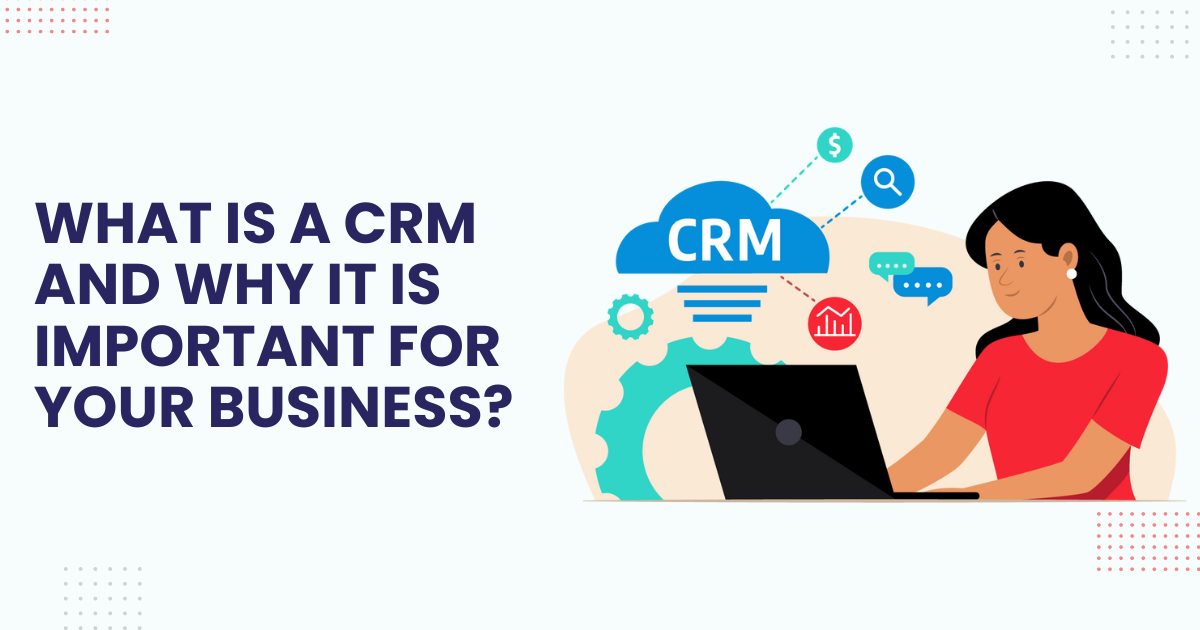What Is A CRM And Why It Is Important For Your Business?
-
Sep 22, 2023
-
05:23 PM

Customer Relationship Management
Customer Relationship Management (CRM) is software designed to assist organizations in managing, tracking, and organizing their customer relations. The CRM system assists you in storing customer information such as user behavior, the duration of a customer's relationship with your company, purchase history, and follow-up notes on sales interactions. You can make better use of this data to enhance customer service throughout your whole company and your sales and marketing operations.
Types of CRM
CRM systems may be classified as either operational, analytical, collaborative, or strategic. Each is made to accomplish a certain corporate objective. Many companies have numerous CRM systems in place or have created a unique CRM solution that integrates features from each system. The difference between the four Customer Relationship Management systems is as follows:
1. Operational CRM
The purpose of operational CRM is to facilitate the execution of sales, marketing, and customer service activities. They facilitate and oversee all client interactions that your business has.
The primary objective of operational CRM is to increase customer acquisition and retention. They do this by assisting in the generation of new leads, nurturing them until they become potential clients, and then keeping them as customers through regular marketing communications and superior customer care.
2. Analytical CRM
Analytical CRM systems collect, archive, and analyze customer data to reveal insights into how consumers engage with your company. This information enables you to evaluate the success of your marketing, sales, and customer service initiatives and modify your strategy as necessary. Run a report on six previous marketing efforts, evaluate the results to determine their effectiveness, and base your subsequent campaigns' strategies on the strategies used in the most successful one.
3. Collaborative CRM
The customer service, sales, and marketing departments commonly work together on client accounts in a large company. Collaboration across departments is made easier by a collaborative CRM, which aims to enhance customer satisfaction and expedite corporate operations.
4. Strategic CRM
Together with collaborative CRM, strategic CRM offers many of the same capabilities. Strategic CRM focuses on long-term client interaction, whereas collaborative CRM focuses on immediate changes. The major objective is to promote client loyalty and retention.
6 reasons why your business should have a CRM
It might not make sense for a startup company to spend money on CRM software before it has any clients. Spreadsheets will only last so long when it comes to controlling customer engagement and lead conversion. Your sales team will find it more difficult to follow up on leads and keep clients happy without the right tools. The worst thing is that you won't even be aware of the business you're missing out on.
A CRM may be quite helpful if your sales force is experiencing issues and losing efficiency. Below we’ll discuss the importance of CRM for your company.
1. Improved customer relationships
Building relationships with clients is the foundation of CRM. Your client information is gathered and put in an accessible format by a CRM system. Having current information is essential for enhancing client relations. For your sales and customer service teams to effectively serve your clients, the information must be freely transferrable across team members.
A CRM's capabilities enable you to accomplish this and much more. CRM would enable you to manage leads, operations, contacts, follow-up interactions, and advertising campaigns, in addition to managing your existing customers, all inside the same app. The amount of data available might be daunting, but a CRM streamlines how you see your metrics. Once the information has been sorted, you can concentrate on clients without forgetting to follow up and enhance interactions, which will eventually lead to higher customer satisfaction and a larger customer base.
2. Better data management
The likelihood is that your company's data is in chaos if you haven't yet invested in a CRM. In sales, it's crucial to have all the information in one location. It hurts your performance to waste time and effort looking for the most recent customer contact in your email to keep current. To be effective while speaking with a client, today's salesman must always have all the necessary information.
A sales CRM program is useful in this situation. The data obtained by your company is stored, arranged, analyzed, and protected by it.
3. Data storage and security
The last few years have seen significant advancements in cloud storage. In terms of storing a significant amount of data, it is effective and dependable. Every SaaS CRM always places a high focus on having several levels of security because the majority of your data maintenance will be automated with a CRM program.
CRM systems safeguard your information, among other things, by deploying numerous data centers, performing daily database backups, and using encrypted and certified transfers.
By using the aforementioned security measures, adopting a CRM protects your data better than keeping it locally or physically on digital devices. CRMs may offer a high degree of protection for all your data storage requirements by preventing data breaches, mishandling, and losses from malware and viruses.
4. Efficient time management
In the current economic scenario, automation is key to effective time management. You'll be able to concentrate more on significant activities if you can do little, laborious jobs with your hands free. With email integration automation, data tracking, and the generation of current reports, a CRM may assist you in achieving this goal.
Time management is made easier with email integration. When it comes to unplanned contacts with your customers, having a comprehensive history of emails sent and received may be helpful. You will not have to go through the hassle of manually updating your records if you use user-friendly contact information management, which means that your contact data is structured and simply editable. When you use filters, your data will be decluttered and you'll always have access to the data you need. Utilizing a CRM program will provide you access to features like these that will make planning your schedule much simpler.
5. Increased productivity
The entire sales process will be considerably simplified by a CRM program. The capacity of your team to interact with clients in a tailored way will be significantly improved by keeping track of information and enabling you to access it anytime you need it. A CRM can free up your staff from boring activities and offer them more time to engage with the clients, in addition to greatly simplifying tasks like data input.
A new salesperson may pick up where the previous one left off since CRM keeps track of the sales process. Since no one would have to start the procedure from scratch, this saves a lot of time.
6. Optimized marketing strategies
Yes, the purpose of a CRM is to boost sales but to do that, you must first review the data and reports from the past and then prepare for the future. You must first specify the objectives you wish to achieve with a CRM. Whether your objectives are to increase lead generation or develop a quicker customer response system, you must give careful consideration to setting them up effectively. CRM software also includes capabilities like a sales funnel, which shows the complete sales process visually. You can rapidly learn how your sales/marketing effort is doing by using a sales funnel. Following that, you may examine the information and determine what actions you should take to enhance your subsequent efforts. Being organized may be tremendously aided by a CRM, but to exploit it to its greatest potential, you must be eager to determine what adjustments are required. In the end, what will make your organization successful is enhancing your tactics to attain your goals using the resources offered by a CRM.
Overall, your business requires a CRM for a variety of reasons, and you should be familiar with the features and advantages of CRM. The decision on whether to purchase a CRM and how to use it will ultimately be yours.






